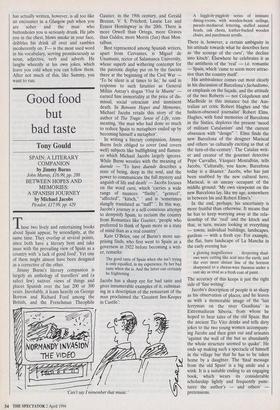Good food but bad taste
Tony Gould
These two lively and entertaining books about Spain appear, by serendipity, at the same time. They overlap at several points, since both have a literary bent and take issue with the prevailing view of Spain as a country with 'a lack of good food'. Yet one of them might almost have been designed as a corrective of the other.
Jimmy Burns's literary companion is largely an anthology of travellers' and (a select few) natives' views of things and places Spanish over the last 200 or 300 years. Inevitably, it leans heavily on George Borrow and Richard Ford among the British, and the Frenchman Theophile Gautier, in the 19th century, and Gerald Brenan, V. S. Pritchett, Laurie Lee and Ernest Hemingway in the 20th. There is more Orwell than Ortega, more Graves than Galdos, more Morris (Jan) than Mon- talban.
Best represented among Spanish writers, apart from Cervantes, is Miguel de Unamuno, rector of Salamanca University, whose superb and withering contempt for the patriotic display put on by the fascists there at the beginning of the Civil War — 'To be silent is at times to lie,' he said in response to such fatuities as General Milian Astray's slogan 'Viva la Muerte' — earned him immortality at the price of dis- missal, social ostracism and imminent death. In Between Hopes and Memories, Michael Jacobs retails this story of the author of The Tragic Sense of Life, com- menting, 'the man who had done so much to reduce Spain to metaphors ended up by becoming himself a metaphor'.
In writing a literary companion, Jimmy Burns feels obliged to cover (and covers well) subjects like bullfighting and flamen- co which Michael Jacobs largely ignores. While Bums wrestles with the meaning of duende — 'To have duende describes a state of being, deep in the soul, and the power to communicate the full mystery and anguish of life and death' — Jacobs focuses on the word cursi, which 'carries a wide range of nuances: "flashy", "genteel", "affected", "kitsch," ' and is 'sometimes slangily translated as "naff". In this way, Jacobs's journey is a self-conscious attempt to demystify Spain, to reclaim the country from Romantics like Gautier, 'people who preferred to think of Spain more as a state of mind than as a real country'.
Kate O'Brien, one of Burns's more sur- prising finds, who first went to Spain as a governess in 1922 before becoming a writ- er, remarks:
The good taste of Spain when she isn't trying is only equalled, in my experience, by her bad taste when she is. And the latter can certainly be frightening .. .
Jacobs has a sharp eye for bad taste and gives innumerable examples of it, culminat- ing in a description of the restaurant of the man proclaimed the 'Greatest Inn-Keeper in Castile': 'Can't say I remember that music.'
A higgledy-piggledy series of intimate dining-rooms, with wooden-beam ceilings, pseudo-mediaeval lettering, stuffed animal heads, oak chests, leather-backed wooden chairs, and parchment scrolls.
There is, however, a certain ambiguity in his attitude towards what he describes here as 'the scourge of the cursi', 'the decline into kitsch'. Elsewhere he celebrates it as the antithesis of the 'real' — i.e. romantic — Spain, which 'came to seem more attrac- tive than the country itself.
His ambivalence comes out most clearly in his discussion of Barcelona's fachadismo, or emphasis on the facade, and the attitude of the two Roberts — not Colquhoun and MacBride in this instance but the Aus- tralian art critic Robert Hughes and 'the fashion-obsessed journalist' Robert Elms. Hughes, with fond memories of Barcelona in the Sixties, deplores the present 'mood of militant Catalanism' and 'the current obsession with "design" '. Elms finds the new Barcelona of the designer Mariscal and others 'as culturally exciting as that of the turn-of-the-century'. The Catalan writ- er and creator of the gourmet detective Pepe Carvalho, Vazquez Montalhan, tells Jacobs, 'Culturally, you know, Barcelona today is a disaster.' Jacobs, who has just been snubbed by the new cultural hero, Mariscal, is an uneasy occupant of the middle ground: 'My own viewpoint on the new Barcelona lay, like my age, somewhere in between his and Robert Elms's.'
In the end, perhaps, his uncertainty is more fruitful than otherwise. It means that he has to keep worrying away at the rela- tionship of the 'real' and the kitsch and that, in turn, means looking at everything — towns, individual buildings, landscapes, gardens — with a fresh eye. For example, the flat, bare landscape of La Mancha in the early evening has
a glowing magnificence . . . deepening shad- ows were cutting like acid into the earth, and the ever more distant line of the horizon sharpened to a cheese-wire fineness under a vast sky as vivid as a fresh coat of paint.
The accuracy of this keeps it just the right side of 'fine writing'.
Jacobs's description of people is as sharp as his observation of places, and he leaves us with a memorable image of the 'last ferryman on the river Guadiana' in Extremaduran Siberia, from whom he hoped to hear tales of the old Spain. But the ancient Tio Vito drinks and tells dirty jokes to the two young women accompany- ing Jacobs and then goes out and urinates 'against the wall of the hut so abundantly the whole structure seemed to quake'. He ends up making such a spectacle of himself in the village bar that he has to be taken home by a daughter. The 'final message from the old Spain' is a big smile and a wink. It is a suitable ending to an engaging book, which wears its considerable scholarship lightly and frequently punc- tures the author's — and others' — pretensions.


























































 Previous page
Previous page